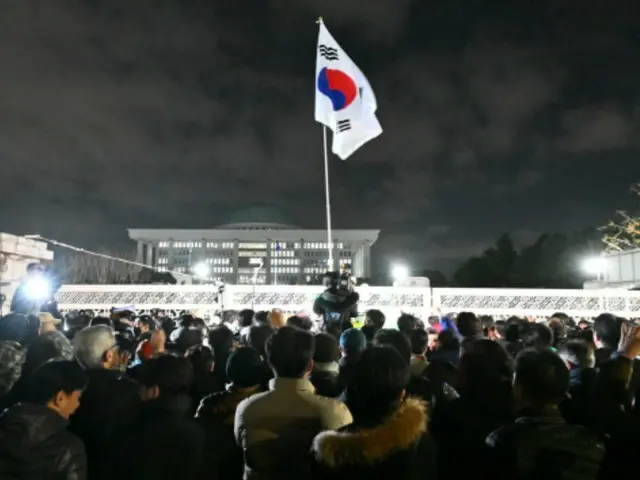It was five and a half hours after the martial law was declared and three and a half hours after the National Assembly passed a resolution calling for the lifting of martial law. President Yoon said in an emergency statement on the same day, "I have decided to end the national emergency starting at 11 o'clock last night.
"We declared martial law with a firm determination to save the nation against anti-national forces that are trying to paralyze the national functions and destroy the constitutional order of liberal democracy," he said. "However, the National Assembly has just lifted martial law.
President Yoon then said, "I will immediately accept the request of the National Assembly through the Cabinet Council and lift martial law," and "I will convene a Cabinet Council and
However, as the votes have not yet been met by dawn, martial law will be lifted immediately. President Yoon added, "However, the repeated impeachments and the privatization of legislation and the budget have led to the collapse of the national government.
"We call on the National Assembly to immediately stop this immoral act that is paralyzing the nation's functioning," he added. According to legal experts, declaring martial law is one of the powers of the president stipulated in the Constitution.
In the event of war, emergency, or similar national emergency, the President may, as required by law, deploy the military to meet military needs or to maintain public peace and order.
The Constitution provides that during a state of emergency, "special measures" may be taken in the warrant system, freedom of speech, press, assembly and association, and the powers of the government and the courts, as provided by law.
The Martial Law Command issued Proclamation No. 1 at 11 p.m. on the 3rd, which states that all political activities, slanderous news, manipulation of public opinion, false incitement, and any acts that promote social unrest are prohibited.
The bill included provisions banning strikes and public gatherings. All speech and publications were to be subject to control, and freedom of speech and publication was to be restricted.
Violators of the proclamation may be arrested, detained, seized, and searched without a warrant under Article 9 of the Martial Law Act, and may be punished under Article 14 of the Martial Law Act.
Article 77, Section 5 of the Constitution clearly states that "When the National Assembly requests the lifting of martial law with the approval of a majority of its members, the President must lift it."
Article 1 stipulates that "If the National Assembly requests the lifting of martial law, the President must lift martial law without delay." The National Assembly passed a resolution calling for the lifting of martial law, and President Yoon
As a result, President Yoon's declaration of emergency martial law appears to have failed after just six hours. However, criticism of the emergency speech continues to mount.
President Yoon's declaration of martial law has plunged the country into chaos, but it appears that President Yoon and his State Councilors have not prepared for an emergency.
Since the establishment of the government in 1948, a total of 16 martial laws have been declared since the inauguration of the First Republic, of which 12 have been emergency martial laws.
The most recent state of emergency in the history of the Korean Constitution prior to this declaration of martial law was in 1979, 45 years ago. The state of emergency was declared immediately after the death of then-President Park Chung-hee in the October 26 Incident.
The emergency martial law was expanded to the whole country on May 17, 1980, by the new military forces including Chun Doo-hwan and Roh Tae-woo. The new military forces imposed the emergency martial law as one of the measures to "resolve the situation."
The violence spread across the country, including Jeju Island. Rallies and demonstrations were held across the country to denounce the new military junta, but the new military junta suppressed them by expanding martial law and took control.
The state of emergency was maintained until January 24, 1981. During this time, the May 18 Gwangju Democratization Movement occurred.
However, President Yoon's declaration of emergency martial law this time is in a different situation and context compared to 45 years ago.
While the new military junta used emergency law to seize power, President Yoon used the opposition party's huge parliamentary seats to his advantage.
The measure was interpreted as a measure taken after the government judged the impeachment and budget maneuvering of the president to be a "national emergency." Meanwhile, the declaration of martial law caused confusion throughout the night.
The comment function of the online community was disrupted, and some online communities were temporarily unavailable. On social media, there were reports of citizens who rushed to the National Assembly in Yeouido, Seoul, in the middle of the night.
Citizens opposed to the emergency law gathered in front of the main gate of the National Diet and other places, and clashes sometimes broke out between the military and police and citizens.
One netizen who saw this commented, "It's not 'Spring in Seoul,' but 'Winter in Seoul' that has arrived," and
The petition received 100 votes in support. By 5 a.m., when the news broke that the Cabinet had passed a resolution to lift martial law, most of the citizens who had gathered in front of the National Diet had already gone home.
2024/12/04 09:36 KST
Copyrights(C) Edaily wowkorea.jp 88

